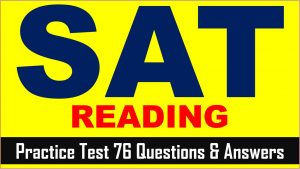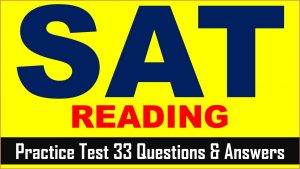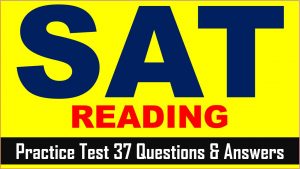SAT (Scholastic Assessment Test) is a standard test, used for taking admission to undergraduate programs of universities or colleges of the United States. SAT is developed and published by the College Board, an organization in the United States, administered by the Educational Testing Service. In this article of AKVTutorials, you will get Kaplan SAT Prep Course Book Review | Practice Test 18 AMBiPi.
Kaplan SAT Prep Course Book Review
Kaplan SAT practice tests are same as real SAT exam. Therefore, if you practice Kaplan SAT practice test daily, then you will be closer to crack the SAT exam.
Some of the SAT practice questions paper are given on online.
To access the online resources for SAT preparation, Goto: KapTest.com/MoreOnline.
Kaplan strategies provides a direction for the SAT preparation and explain each and every skill which is required for creaking SAT exam.
Hence, if you invest more in the preparation for SAT by studying Kaplan SAT practice questions sets, the greater your chances of getting higher SAT score and then you will be very close to get admission into your top-choice colleges.
In this SAT prep book, there are following sections are made in each chapter.
- “How Much Do You Know?”
- “Check Your Work”
- “Try on Your Own”
- “How Much Have You Learned?”
In SAT exam, different questions of different topics are asked, which has different number of points (means SAT scores).
By analyzing these topics, Kaplan contains all those topics which are very close to appear in SAT papers.
Therefore, to learn these topics, you should study Kaplan SAT Prep Plus book.
Check Price On Amazon
SAT Reading Practice Passage
This passage is adapted from Emily Anthes, Frankenstein’s Cat. ©2013 by Emily Anthes.
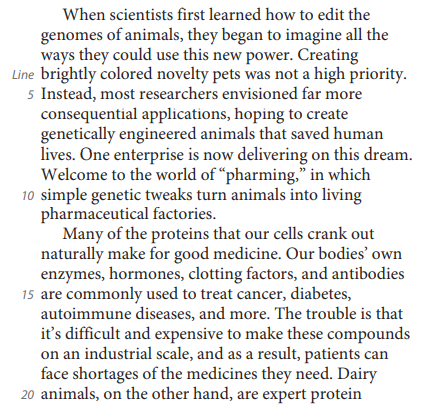
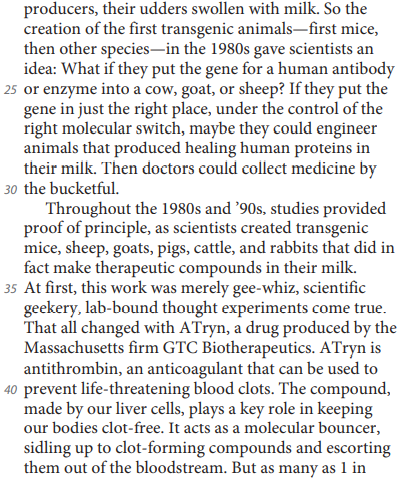
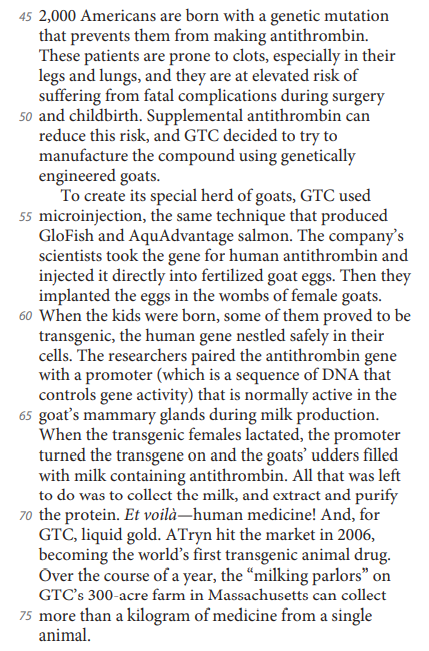
SAT Reading Comprehension Practice Test Questions
SAT Practice Test 18 Question No 1
The primary purpose of the passage is to
Option A: present the background of a medical breakthrough.
Option B: evaluate the research that led to scientific discovery.
Option C: summarize the findings of a long-term research project.
Option D: explain the development of a branch of scientific study.
SAT Practice Test 18 Answer No 1
Show/Hide Answer
Option A :
Lines 9-11 introduce the focus of the passage: “Welcome to the world of ‘pharming,’ in which simple genetic tweaks turn animals into living pharmaceutical factories.” The passage then discusses the chronological development of “pharming,” and describes ATryn, a useful drug produced after decades of laboratory experiments.
Choices B and C are incorrect because the passage does not primarily evaluate research or summarize long-term research findings. Choice D is incorrect because “pharming” is not a branch of scientific study.
SAT Practice Test 18 Question No 2
The author’s attitude toward pharming is best described as one of
Option A: apprehension.
Option B: ambivalence.
Option C: appreciation.
Option D: astonishment.
SAT Practice Test 18 Answer No 2
Show/Hide Answer
Option C :
The author is appreciative of pharming and describes it as turning “animals into living pharmaceutical factories” (lines 10-11). She expresses a positive view of pharming in line 70 when she describes its end result: “Et voilà—human medicine!”
Choices A, B, and D are incorrect because the author’s attitude about pharming is not accurately characterized as one of fear, disinterest, or surprise.
SAT Practice Test 18 Question No 3
As used in line 20, “expert” most nearly means
Option A: knowledgeable.
Option B: professional.
Option C: capable.
Option D: trained.
SAT Practice Test 18 Answer No 3
Show/Hide Answer
Option C :
In lines 19-21, the author explains that dairy animals are “expert,” or capable, “protein producers.”
Choices A, B, and D are incorrect because in this context “expert” does not mean knowledgeable, professional, or trained.
SAT Practice Test 18 Question No 4
What does the author suggest about the transgenic studies done in the 1980s and 1990s?
Option A: They were limited by the expensive nature of animal research.
Option B: They were not expected to yield products ready for human use.
Option C: They were completed when an anticoagulant compound was identified.
Option D: They focused only on the molecular properties of cows, goats, and sheep.
SAT Practice Test 18 Answer No 4
Show/Hide Answer
Option B :
In line 36, the author explains that the initial transgenic studies were “lab-bound thought experiments come true.” Those first studies, in other words, were considered to be of theoretical value only. They were not expected to yield products ready for human use.
Choices A and D are incorrect because the cost of animal research and the molecular properties of certain animals are not discussed in the passage. Choice C is incorrect because the passage does not suggest that all of the transgenic studies were focused on anticoagulants.
SAT Practice Test 18 Question No 5
Which choice provides the best evidence for the answer to the previous question?
Option A: Lines 16-19 (“The trouble… need”)
Option B: Lines 25-29 (“If they… milk”)
Option C: Lines 35-36 (“At first… true”)
Option D: Lines 37-40 (“That all… clots”)
SAT Practice Test 18 Answer No 5
Show/Hide Answer
Option C :
In lines 35-36, the author provides evidence that the transgenic studies done in the 1980s and 1990s were not expected to yield products ready for human use. The author explains that the initial transgenic studies were “merely gee-whiz, scientific geekery, lab-bound thought experiments come true.”
Choices A, B, and D are incorrect because they do not provide evidence that the transgenic studies done in the 1980s and 1990s were not expected to yield products ready for human use. Choices A and B do not address the transgenic studies, and choice D focuses on ATryn, a drug that was intended for human use.
SAT Practice Test 18 Question No 6
According to the passage, which of the following is true of antithrombin?
Option A: It reduces compounds that lead to blood clots.
Option B: It stems from a genetic mutation that is rare in humans.
Option C: It is a sequence of DNA known as a promoter.
Option D: It occurs naturally in goats’ mammary glands.
SAT Practice Test 18 Answer No 6
Show/Hide Answer
Option A :
Lines 42-44 explain that ATryn “acts as a molecular bouncer, sidling up to clot-forming compounds and escorting them out of the bloodstream.” Antithrombin can thus be seen as an agent that reduces the amount of dangerous clots in the bloodstream.
Choices B, C, and D are incorrect because the passage does not suggest that antithrombin stems from a rare genetic mutation, is a sequence of DNA, or occurs naturally in goats’ mammary glands.
SAT Practice Test 18 Question No 7
Which choice provides the best evidence for the answer to the previous question?
Option A: Lines 12-16 (“Many… more”)
Option B: Lines 42-44 (“It acts… bloodstream”)
Option C: Lines 44-46 (“But as… antithrombin”)
Option D: Lines 62-65 (“The researchers… production”)
SAT Practice Test 18 Answer No 7
Show/Hide Answer
Option B :
Lines 42-44 provide evidence that antithrombin reduces compounds that lead to blood clots, as it acts as a “molecular bouncer, sidling up to clot-forming compounds and escorting them out of the bloodstream.”
Choices A, C, and D do not provide evidence that antithrombin reduces compounds that lead to blood clots; these lines describe proteins, people unable to produce antithrombin, and the production of ATryn.
SAT Practice Test 18 Question No 8
Which of the following does the author suggest about the “female goats” mentioned in line 59?
Option A: They secreted antithrombin in their milk after giving birth.
Option B: Some of their kids were not born with the antithrombin gene.
Option C: They were the first animals to receive microinjections.
Option D: Their cells already contained genes usually found in humans.
SAT Practice Test 18 Answer No 8
Show/Hide Answer
Option B :
In lines 60-62, the description of female goats’ kids mentions that “some of them proved to be transgenic, the human gene nestled safely in their cells.” The statement “some of them” indicates that while a number of the newborn goats were transgenic, others were not.
Choices A, C, and D are incorrect because the passage does not suggest that the female goats used in the initial experiment secreted antithrombin in their milk after giving birth, were the first animals to receive the microinjections, or had cells that contained genes usually found in humans.
SAT Practice Test 18 Question No 9
The most likely purpose of the parenthetical information in lines 63-64 is to
Option A: illustrate an abstract concept.
Option B: describe a new hypothesis.
Option C: clarify a claim.
Option D: define a term.
Show/Hide Answer
Option D :
In lines 63-64, the parenthetical is added after the phrase “a promoter,” which is “(. . . a sequence of DNA that controls gene activity).” The parenthetical’s purpose is to define the term “promoter.”
Choices A, B, and C are incorrect because they do not correctly identify the purpose of the parenthetical information in lines 63-64.
SAT Practice Test 18 Question No 10
The phrase “liquid gold” (line 71) most directly suggests that
Option A: GTC has invested a great deal of money in the microinjection technique.
Option B: GTC’s milking parlors have significantly increased milk production.
Option C: transgenic goats will soon be a valuable asset for dairy farmers.
Option D: ATryn has proved to be a financially beneficial product for GTC.
SAT Practice Test 18 Answer No 10
Show/Hide Answer
Option D :
Gold is a valuable element that commands high prices, so calling something “liquid gold” implies that it has great value. Because the pharmaceutical company GTC was producing the drug in order to sell it, it can be inferred that describing ATryn as “liquid gold” means it proved to be a lucrative product for GTC.
Choices A, B, and C are incorrect because the phrase “liquid gold” does not refer to the microinjection technique, efficiency in dairy production, or transgenic goats being beneficial to dairy farmers.



